Blog
Top Stories
Sustainability Conclave: Green Growth for a Viksit Bharat
As India moves toward its vision of Viksit Bharat by 2047, Green Growth has become essential to achieving sustainable and inclusive development. It promotes economic progress while safeguarding the environment, emphasising clean energy, resource efficiency, and innovation. Green growth not only addresses climate change but also fosters job creation, sustainable industries, and resilient ecosystems. By embracing this approach, India can ensure that its journey toward becoming a developed nation is both environmentally responsible and future-ready.
Keeping this context in mind, Bombay Chamber, under the aegis of its Sustainability Committee, organised its Annual Sustainability Conclave themed Green Growth for a Viksit Bharat on December 13th, 2024, at the St. Regis Hotel, Mumbai. Over 85 delegates attended the Sustainability Conclave, including a dynamic lineup of Directors, CXOs, CSOs, Managing Directors, and CEOs, making it a power-packed gathering of industry leaders.
The conclave opened with remarks by Pinky Mehta, President of the Bombay Chamber and CFO of Aditya Birla Capital Ltd., followed by a keynote address by Lt. Gen. Pawan Chadha, VSM, General Officer Commanding (Maharashtra, Gujarat & Goa Area), who provided valuable insights into India’s sustainable development journey and how the armed forces is working towards a sustainable army.
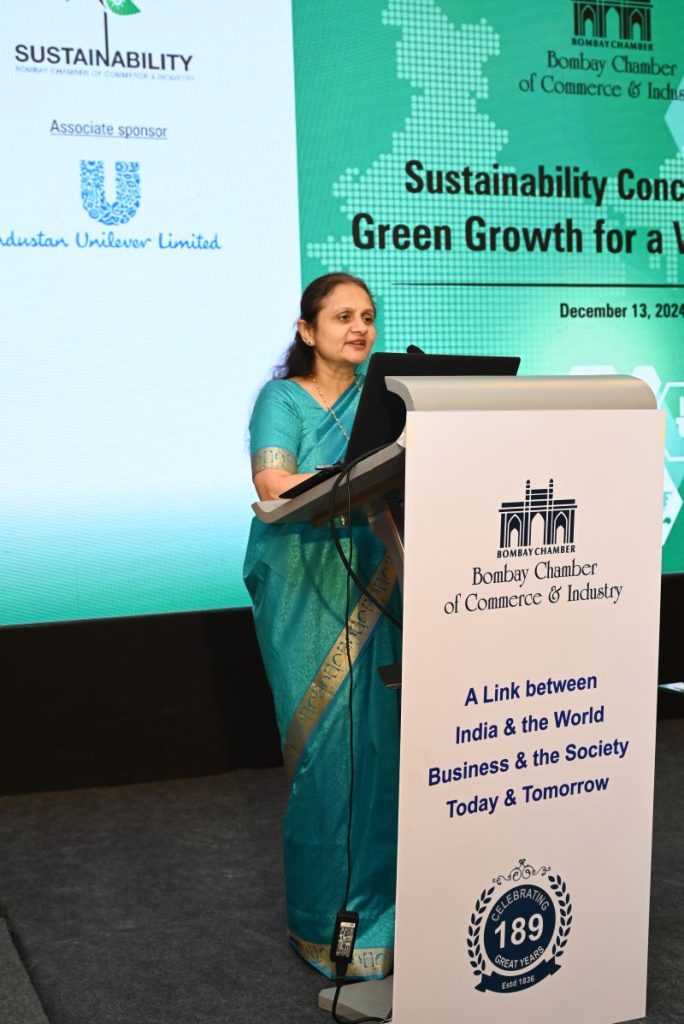
The first panel discussion, moderated by Sachin Jain, CEO India and Southeast Asia of Cleantech Renewable Assets, explored business opportunities for green growth. The panel included distinguished speakers such as Anjali Bansal, Founder of Avaana Capital; Amit Kumar Sinha, MD & CEO of Mahindra Lifespace Developers; Vineet Rai, Founder of Aavishkaar Group; and Deepesh Nanda, President of Renewables at Tata Power and MD & CEO of Tata Power Renewable Energy Limited.
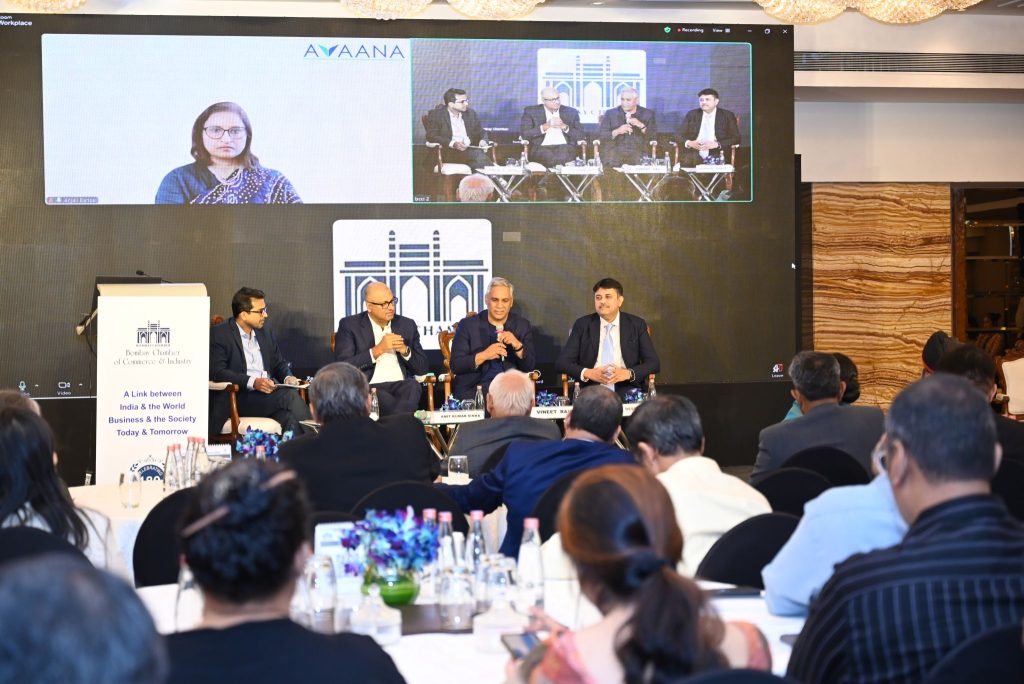
A fireside chat on the topic Carbon Credits: The India Story featured Anirban Ghosh, Chairperson of the Sustainability Committee of the Bombay Chamber and Head of the Centre for Sustainability at Mahindra University, in conversation with Dr. Rambabu Paravastu, Advisor to Greenko Group and the World Bank Group, and GC Advisory Chairperson of the Forum for Sustainable Enterprises.
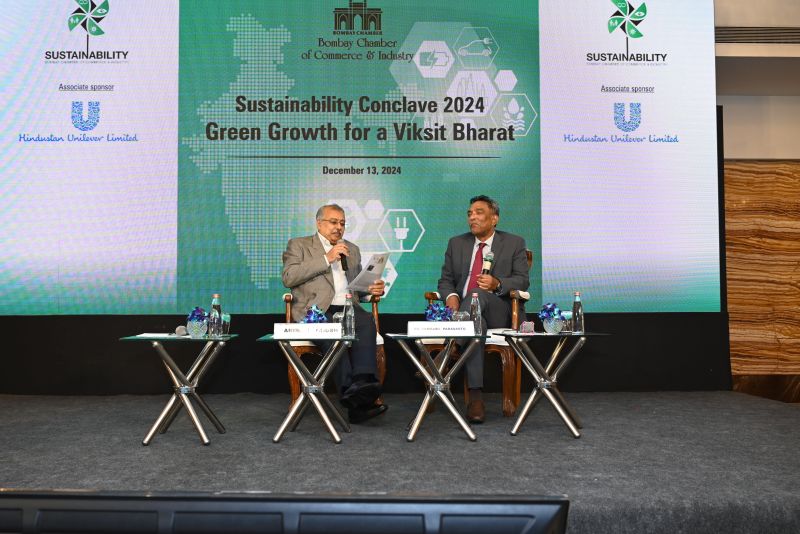
The second panel discussion focused on navigating an evolving BRSR landscape. Moderated by Smitha Hari, President (India) of auctusESG, the session featured prominent panelists including Anirban Ghosh, Chairperson of the Sustainability Committee of the Bombay Chamber and Head of the Centre for Sustainability at Mahindra University; S Lakshminarayanan, Executive Director (Sustainable Development) of Indian Oil Corporation; and Santosh Kumar Singh, Chief Sustainability Officer of Larsen & Toubro.
The conclave concluded with a vote of thanks delivered by Sandeep Khosla, Director General of the Bombay Chamber.
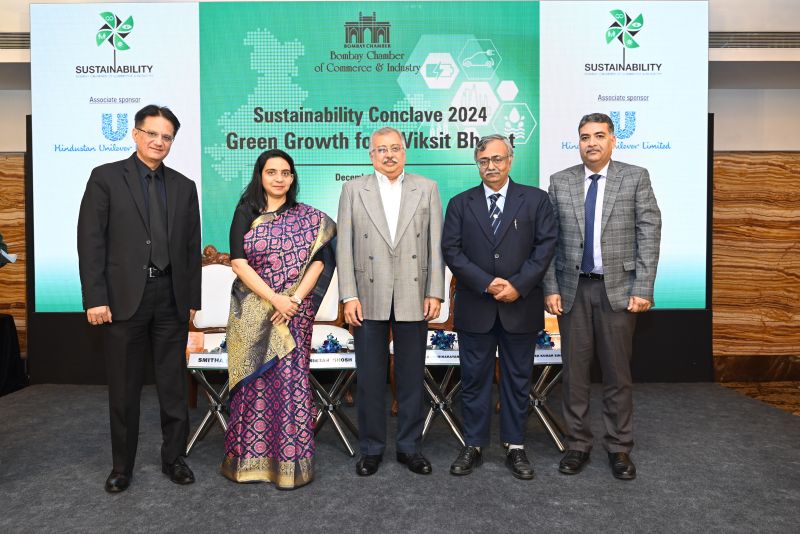
Lothal to become Global Hub for Maritime Heritage with National Maritime Heritage Complex”: Sarbananda Sonowal
Lothal to become Global Hub for Maritime Heritage with National Maritime Heritage Complex”: Sarbananda Sonowal
The Union Minister of Ports, Shipping and Waterways, Shri Sarbananda Sonowal along with the Minister of Labour & Employment and Youth Affairs, Dr Mansukh Mandaviya and the Chief Minister of Gujarat, Shri Bhupendra Patel made a joint review to assess the progress of the National Maritime Heritage Complex (NMHC) in Lothal, Gujarat, on Saturday.
The Ministry of Ports, Shipping, and Waterways, under Sagarmala Programme is developing the National Maritime Heritage Complex, a world-class facility which will showcase India’s maritime heritage from ancient to modern times, adopting an innovative “edutainment” approach using cutting-edge technology to spread awareness and attract international tourists.
Lothal, a prominent city of the ancient Indus Valley Civilisation dating back to 2400 BCE, holds historical significance for its advanced dockyard, thriving trade, and renowned bead-making industry. Artifacts such as seals, tools, and pottery unearthed by archaeologists reveal a rich cultural and economic history, making it a pivotal site of the Harappan civilisation.
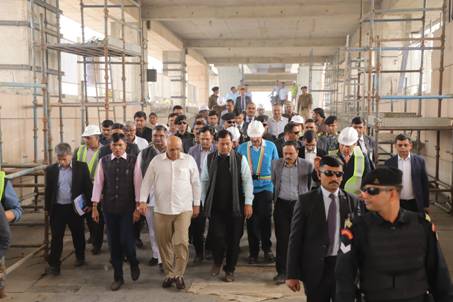
The Ministers toured key project landmarks, including INS Nishank, the Lothal Jetty Walkway, and the Museum Block. They also interacted with onsite workers to understand their challenges being faced and progress made so far. Shri Sonowal expressed satisfaction with the significant milestones achieved in civil infrastructure development, noting that the project is advancing on schedule.
Boosting Local Involvement and National Heritage
A key focus of the review was the integration of local communities into the project’s development. Speaking on the occasion, Shri Sarbananda Sonowal said, “We are committed to ensuring that the NMHC is completed on time and to the highest standards. This project will boost tourism, provide a platform for maritime education, and foster collaboration between India’s maritime community and the global industry. It is a crucial step toward making India a leading maritime nation.”
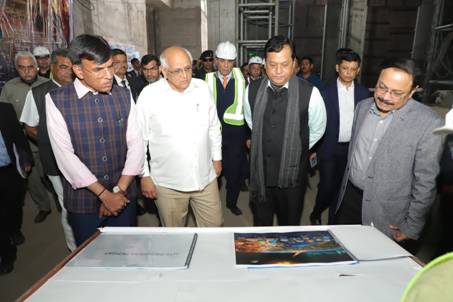
Highlighting the socio-economic impact of the project, Shri Sarbananda Sonowal said, “This project will create employment, foster skill development, and empower the youth of Gujarat. The NMHC is a project of national importance, offering tremendous opportunities for growth and learning in the maritime sector. The visionary leadership of PM Shri Narendra Modi ji has ensured that India remains on course towards all round development of the country and that the people reap the fruit of India’s developmental story.”
The NMHC is poised to become a cornerstone of India’s maritime legacy, harmonising cultural and historical significance with economic and educational development. With 65 per cent of Phase 1A already completed, the project is on track to meet its timeline and establish itself as a global beacon of maritime heritage.
“Under the dynamic leadership of Prime Minister Shri Narendra Modi ji, the government is committed to ensuring the National Maritime Heritage Complex (NMHC) is completed on time and to the highest standards,” said Sarbananda Sonowal. “The project will boost tourism, provide a platform for maritime education, and foster greater collaboration between India’s maritime community and the global maritime industry. This is a crucial step toward realising the vision of making India a leading maritime nation – boosting the effort led by Shri Modi ji towards transforming India into becoming an Atmanirbhar Bharat by 2047,” the Union Minister added.
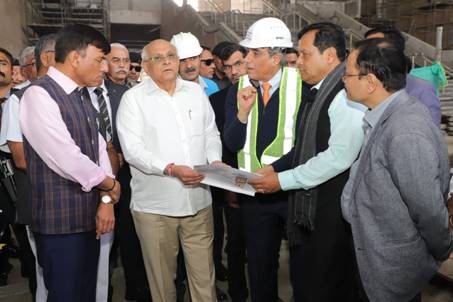
The Government of India remains steadfast in its commitment to the success of the NMHC, which is expected to boost Gujarat’s tourism economy and solidify India’s position as a maritime leader on the world stage.
The National Maritime Heritage Complex (NMHC) in Lothal, Gujarat, is set to become an international tourist hotspot, celebrating India’s rich maritime legacy. Spanning from ancient civilisations to modern times, the complex will use a unique blend of education and entertainment, incorporating the latest technology to immerse visitors in the country’s maritime history.
Designed as a world-class destination under the Sagarmala Programme, NMHC aims to showcase India’s naval achievements and cultural connections through interactive exhibits, state-of-the-art displays, and engaging storytelling. This initiative is poised to not only preserve India’s maritime heritage but also to attract global tourists and foster a deeper appreciation of its historical significance.
Senior officials of the Ministry of Ports, Shipping, and Waterways, the Ministry of Defence (Navy and Coast Guard), the Government of Gujarat, renowned architect Hafeez Contractor, and Tata Projects Ltd have participated in the review.
Bombay Chamber’s 15th AgriCorp focuses on FPOs as pathways to link farmers to the value chain
Bombay Chamber’s 15th AgriCorp focuses on FPOs as pathways to link farmers to the value chain
Pune:
Bombay Chamber recently organised its 15th AgriCorp Conference themed ‘Enriching FPOs’ in Pune. The event was held over two days and was held in partnership with KISAN and was supported by State Bank of India, Axis Bank, Rallis India, MTS S.r.l, IDBI Bank, Nichem Solutions, Union Bank of India, KETO Pharma, AGRIBAZAAR and NABARD.

Dr. P K Chakrabarty, PhD, FNAAS, Chief Scientific Advisor, Dhanuka Agritech and former Member – ASRB, DARE, MoA & FW, ADG (PP&B), ICAR and Krishi Bhawan was the guest of honor. In his presentation, Dr Chakrabarty said that Agricultural prosperity was a game changer to national prosperity. While comparing India and China, he said that India’s inherent rich geographical advantages support its potential to become the global food and manufacturing hub. However, he pointed out that despite having 30% more arable land and 67% more rainfall, India’s agricultural GDP is only about 1/3rd of that of China. Nonetheless, there is a considerable disparity between the two countries in the usage of fertilisers and pesticides, two crucial components for optimum production and protection.
He listed some of the challenges that India faces and which need intervention both form government and the private sector. The challenges include less expenditure on research in India vs developed nations; crop losses which threaten our food and nutritional security; illicit/counterfeit fertiliser products; regulatory challenges; Pesticide Management Bill; lack of awareness regarding spread of technology. Dr Chakrabarty also questioned whether the Indian cropping system is ready to embrace organic cultivation without compromising on food security.
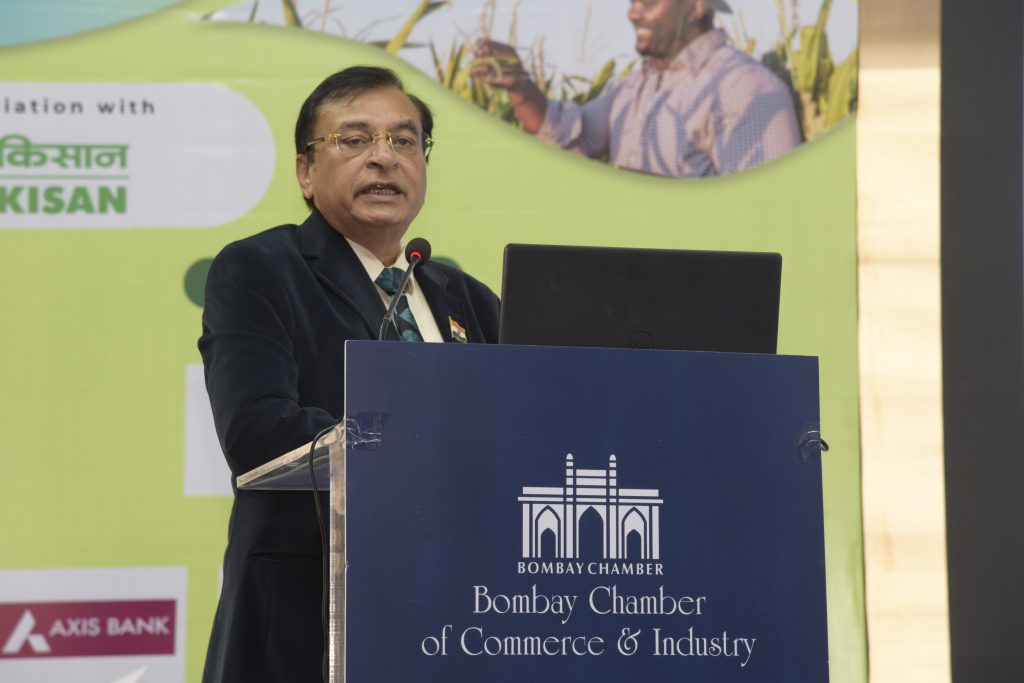
The first day saw several knowledge sessions including a panel discussion on Current & Upcoming Govt Schemes for FPOs moderated by Dr. Sudhir Kumar Goel, IAS, Former Additional Chief Secretary (Agriculture and Marketing), Government of Maharashtra & Mentor, Agriculture & Food Processing Committee, Bombay Chamber. Speakers included Shri Uday Deshmukh, Additional Project Director, SMART – Government of Maharashtra; Dr Amol M. Yadav, Additional Project Director, MAGNET and Dr Prashant Waghmare, Deputy General Manager & Regional Head Mumbai, APEDA.
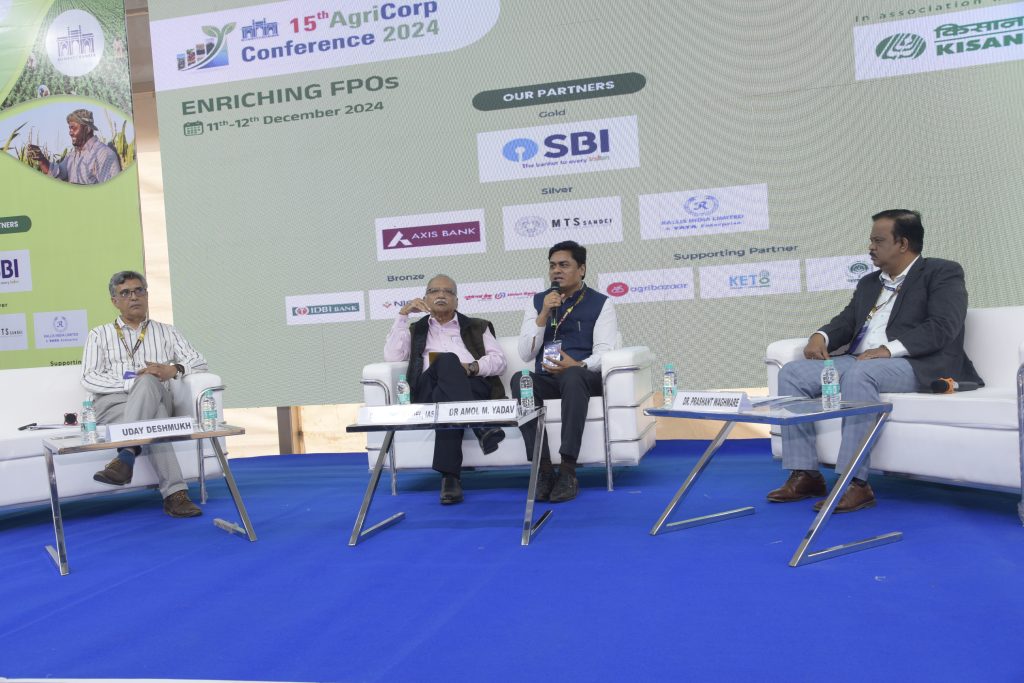
The second panel discussion on the same day was on FPO Start-Ups (Success Stories). The session was moderated by Prasad More, Product Head Organic And Lead Auditor, Cert ID India and the panelists were Vikram Deshmukh, Director, Rui Farmer Produce Company; Jaysing P. Hulawle, Production Head, Pawna Sanskruti Farmers Producer Company and Mithilesh Desai, Managing Director, Jackfruitking Agro Producer Company.
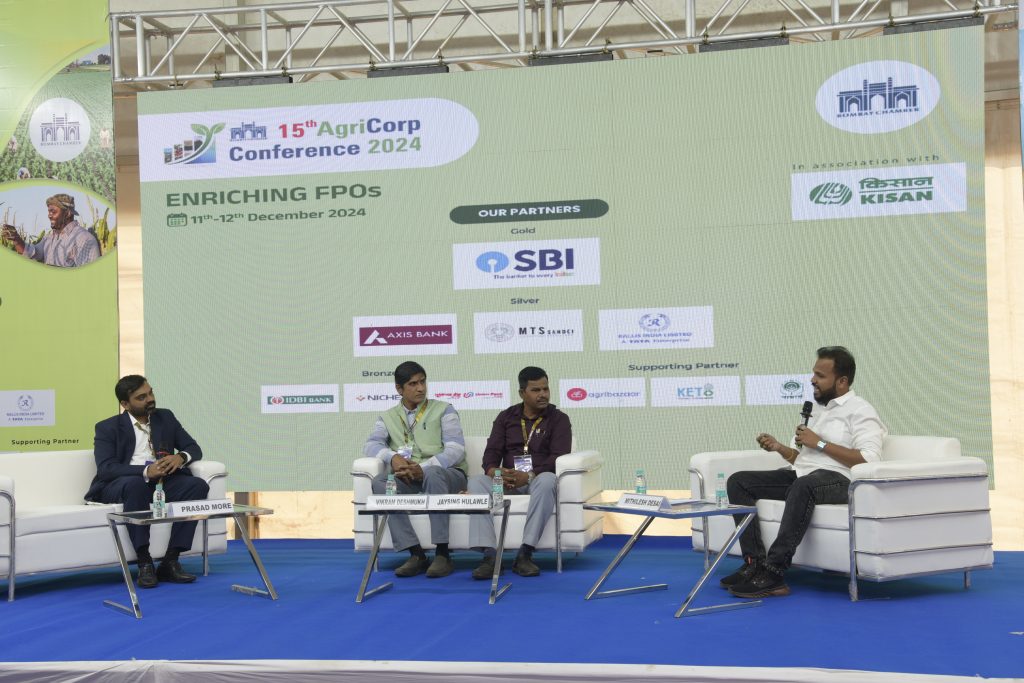
The second day started with a session on Digitalisation in Agriculture (Climate Stack, Agri Stack, Mandi Stack). The moderator was Rajesh Urkude, Digital Food Initiative – Operations, Tata Consultancy Services and the speakers were Dr Rahul Mirchandani, Managing Director, Aries Agro; Sachin Nandwana, Co-Founder and Director, BigHaat Agro and Saurabh Khanna, MD & CEO, NeRL.
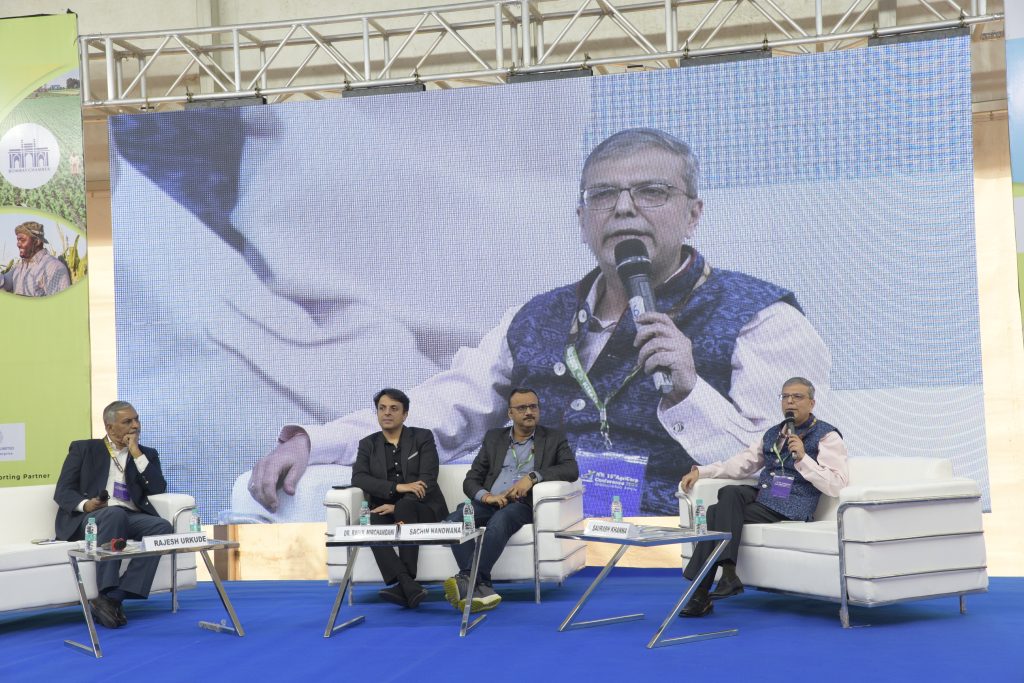
Another session on Export Success Stories was moderated by Azhar Tambuwala, Executive Director Sahyadri Farmers Post Harvest Care (Sahyadri Farms) & Expert Committee Member, Agriculture & Food Processing Committee, Bombay Chamber. The speakers included Anant More, President, Fratelli Fruits Farmer Producer Company; Narendra Patil, Vice-President, Soex Flora and Kapil Sawant, Senior Manager, Farmonaut.
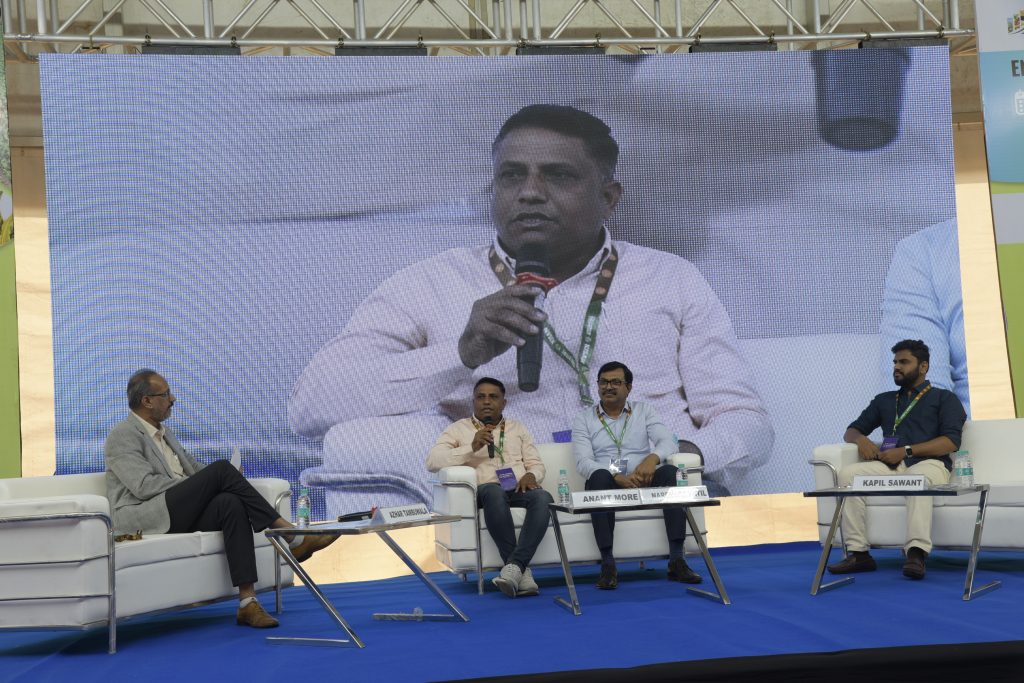
This was followed by a presentation on MTS Sandei, Tomato Harvesters for Industrial Tomatoes by Matteo Migliorini, Export Manager, MTS S.r.l., Italy.
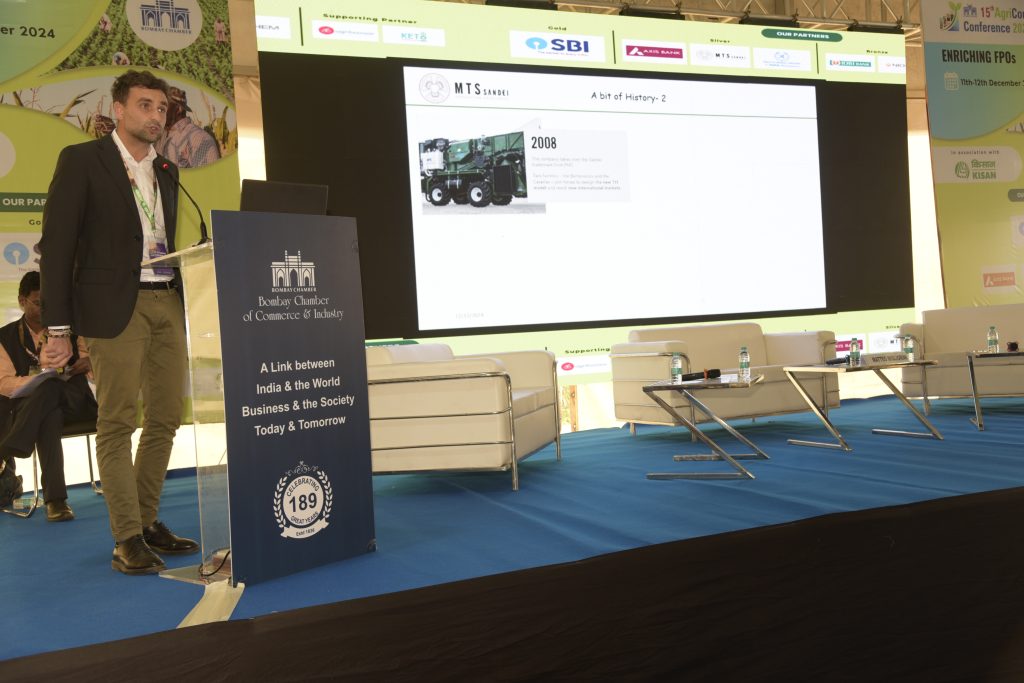
The session on Understanding Quality Control under Fresh Produce was moderated by Rajesh Sinha, Angel Investor, Consultant & Expert Committee Member, Agriculture & Food Processing Committee, Bombay Chamber. The speakers included Smita Murty, India Representative for FSSC; Anupama Patil, Assistant Commissioner of Food, Food and Drug’s Administration (FDA) Maharashtra and Dr Chun Mei Chang, COO, Envirocare Labs.
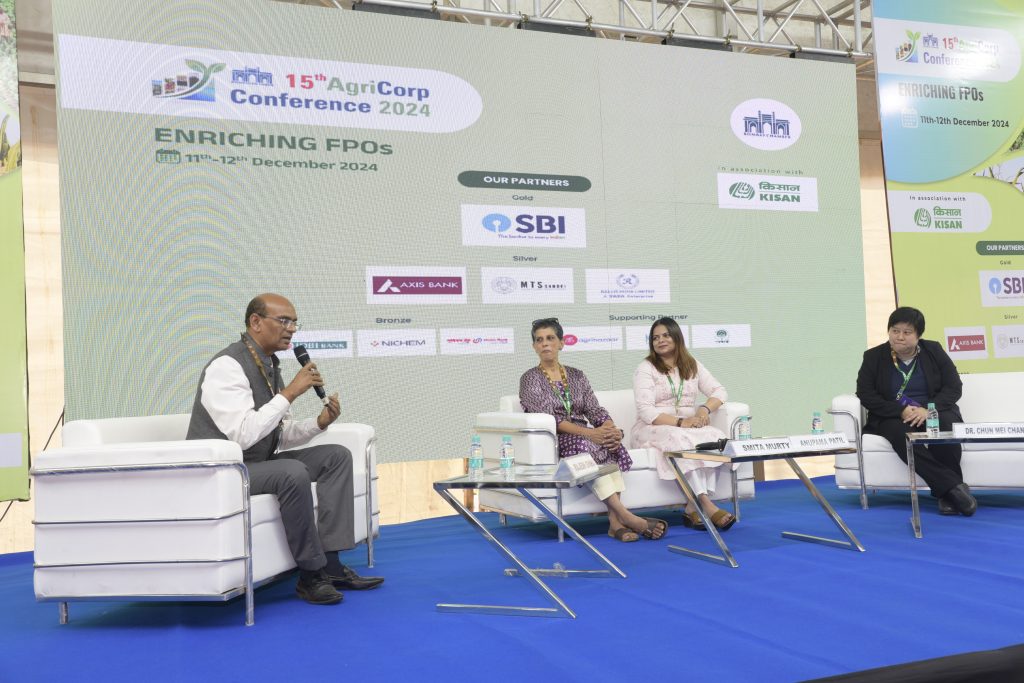
The final session of AgriCorp was on Finance (PSU, Banks, NBFCs). The moderator was Dr Sudhir Kumar Goel, IAS, Former Additional Chief Secretary (Agriculture and Marketing), Government of Maharashtra & Mentor, Agriculture & Food Processing Committee, Bombay Chamber and the speakers included Yogendra Shelkey, DGM – Agri Business Unit, SBI; Saleem Kamaal, Head, Bharat Enterprises, Axis Bank; Ghazi Islam, GM, IDBI Bank and Dr Pradeep Parate, GM, NABARD, Pune.
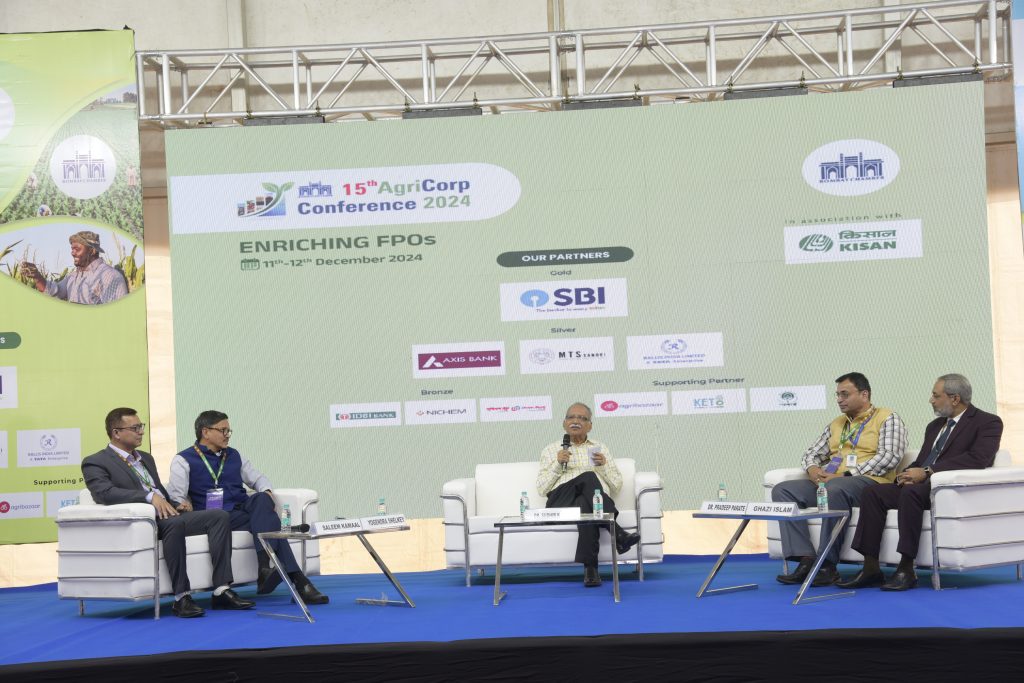
Bombay Chamber celebrates 189th Foundation Day, Kumar Mangalam Birla shares his vision of roadmap to Viksit Bharat
Bombay Chamber celebrates 189th Foundation Day, Kumar Mangalam Birla shares his vision of roadmap to Viksit Bharat
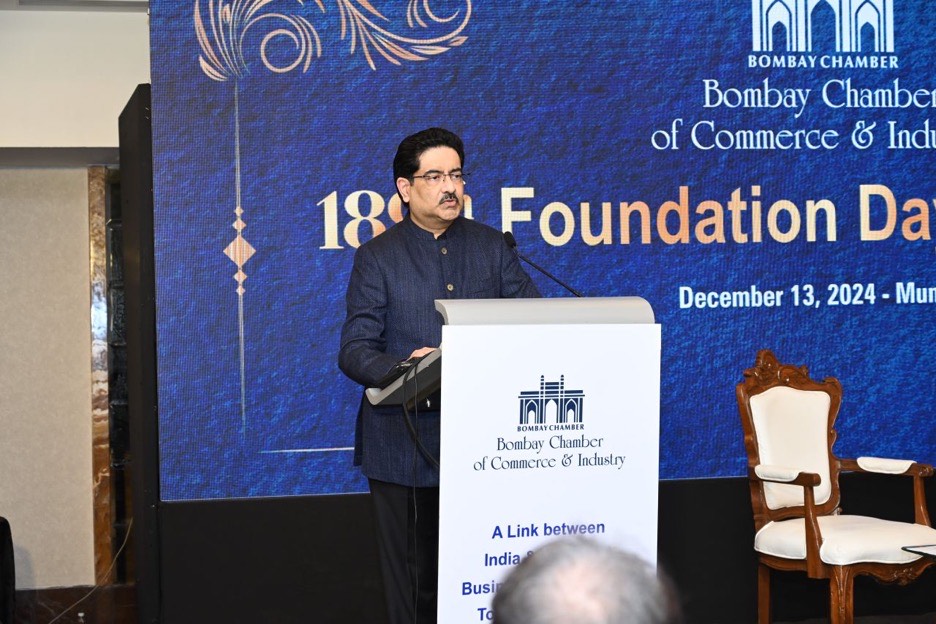
Mumbai, December 13, 2024: Bombay Chamber of Commerce & Industry, India’s oldest industry Chamber celebrated its 189th Foundation Day recently. Industrialist Kumar Mangalam Birla, Chairman of the Aditya Birla Group who was the Chief Guest on the occasion shared his vision on India’s Viksit Bharat journey and stated that there are four fundamental aspects that will drive India’s Viksit Bharat journey: Business, Innovation, Talent and Sustainability (BITS).
Speaking at the Chamber’s 189th Foundation Day, he said, “These four pillars will shape India’s future as a global leader. For Business, the government has done its bit by creating the enabling ecosystem and it is now for the businesses to drive growth forward. The large Indian companies of tomorrow will emerge from the entrepreneurs of today. In Innovation, India has demonstrated the power of public digital goods like Anna Yojana Scheme, Housing for All, etc. The need of the hour is to leverage tech across all sectors. As for Talent, globally Indians are creating or leading the biggest companies. India’s workforce is shifting from agriculture to more productive sectors. Industry 4.0 needs to adopt AI, ML, IoT and needs concerted efforts in education and skilling. In Sustainability, economic growth and social equity need to advance in sync.”
He commended the vast history of the Chamber in promoting the Mumbai region and serving as an effective vehicle between industry and the government. He added, “Viksit Bharat by 2047 is an inspiring vision and the Chamber’s mission statement captures this vision. Ten years ago, India was the 11th largest economy in the world. Today, we are the fifth and on the way to beating Japan to become the fourth largest economy. By 2030, 80% of households in India will enter the middle income group, up from the current 50%. This is the largest national development effort any economy has made. Initiatives like Aadhaar, Jan Dhaan, UPI have brought in financial inclusion. Urbanisation is on the rise, every minute 30 people are moving from the villages to the cities. By the next decade, 25% of the incremental global workforce will come from India – this will power Viksit Bharat.” He said 18-year-old chess grandmaster D Gukesh’s recent historic win is emblematic of the rise of a new India, which is young and self-assured.
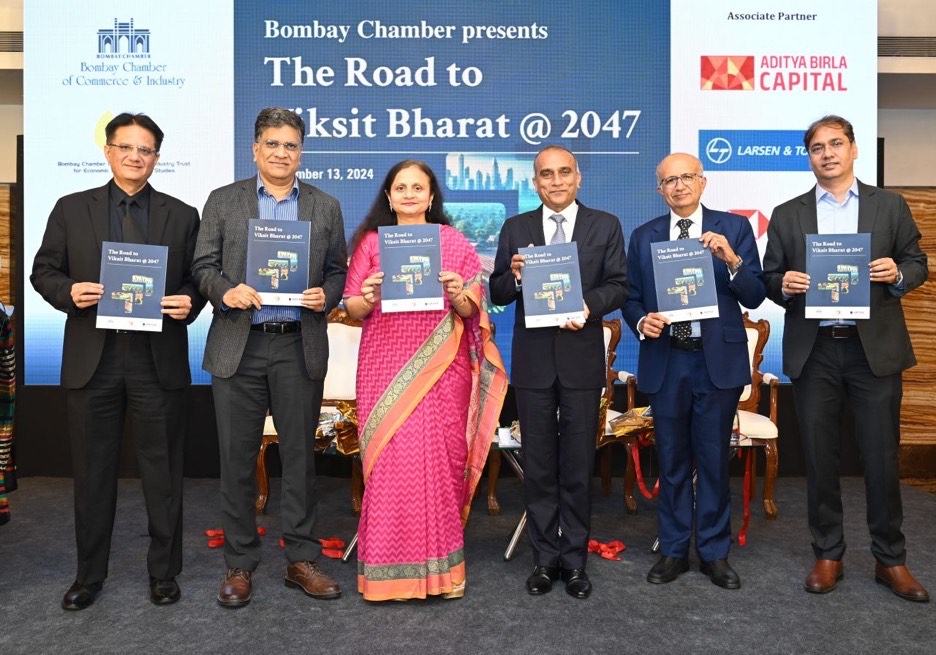
On the same occasion, Bombay Chamber of Commerce & Industry unveiled its much-anticipated report on Viksit Bharat @ 2047 setting the stage for India’s vision of development over the next two decades.
The report which was commissioned to Artha India Research Advisors, was unveiled by Pinky Mehta, President of Bombay Chamber & CFO, Aditya Birla Capital Ltd., alongwith key industry leaders including Sudhanshu Vats, Vice President, Bombay Chamber & Managing Director Designate, Pidilite Industries Ltd.; Sudhir Kapadia, Senior Advisor, EY India; Dr. Sachchidanand Shukla, Chairman, EPR&D Committee, Bombay Chamber & Group Chief Economist, L&T, Dr. Niranjan Rajyadhyaksha, Executive Director – Research & Strategy, Artha Global and Sandeep Khosla, Director General, Bombay Chamber.
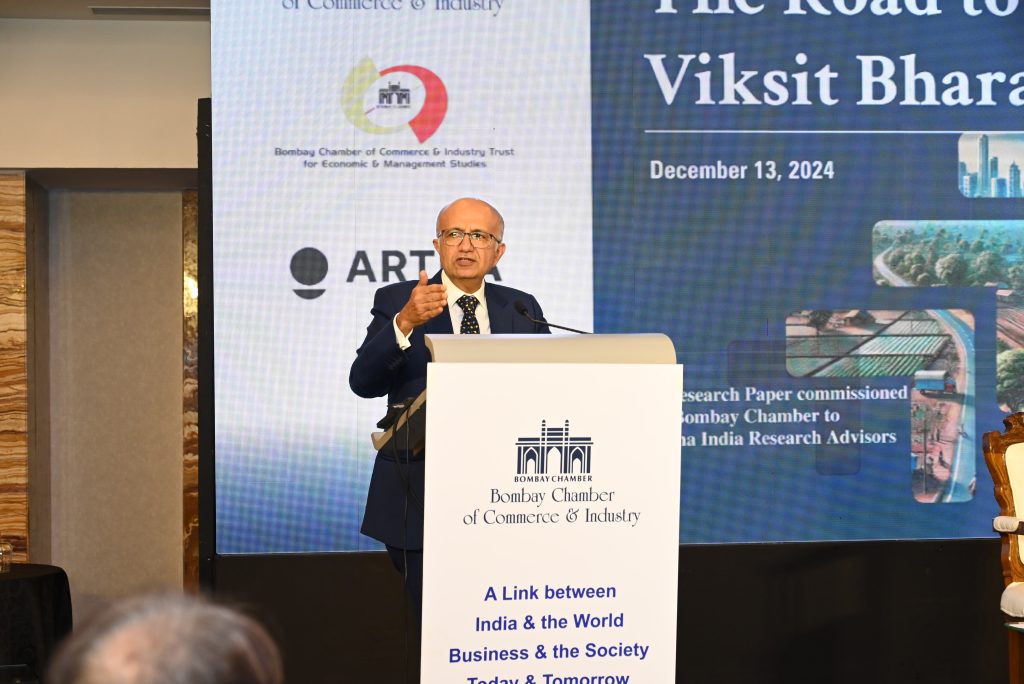
Sudhir Kapadia, Senior Advisor at EY India, set the context for the report launch, providing deep insights into India’s economic journey and the strategic steps needed to achieve the vision of Viksit Bharat. His expert perspective framed the conversation, emphasising the importance of sustainable growth, innovation, and inclusive development for India to emerge as a global leader. Citing examples of Germany and Japan where the national resolve to rebuild post WW2 was palpable, he said that there need for a similar national resolve to achieve a Viksit Bharat.
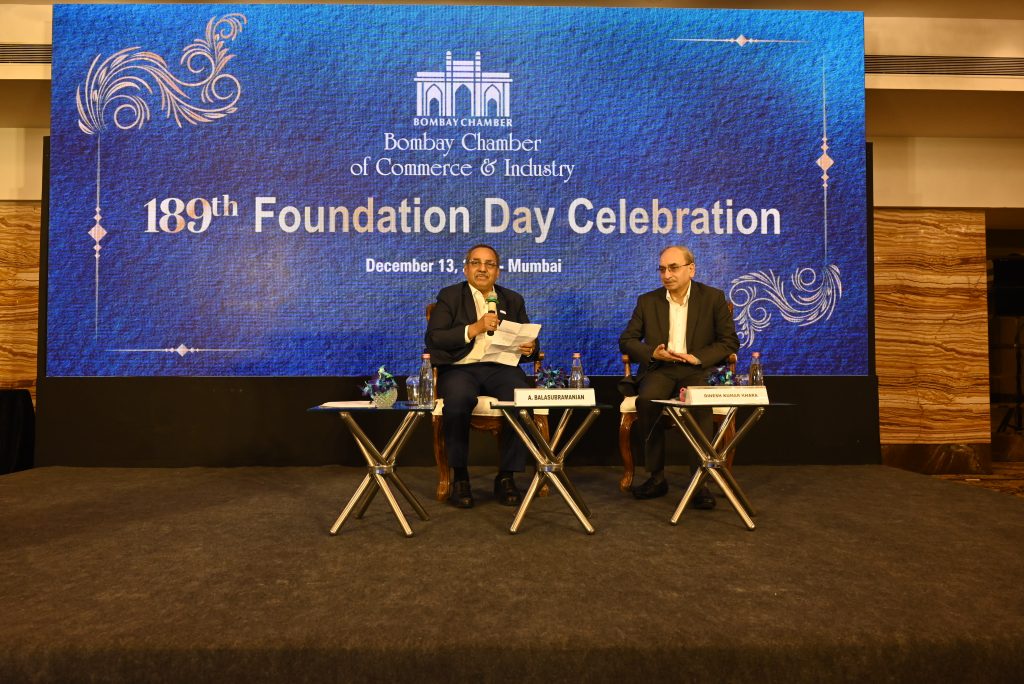
The evening also saw an interesting Fireside Chat between A. Balasubramanian, Managing Director & CEO of Aditya Birla Sun Life AMC Ltd and Dinesh Kumar Khara, former Chairman, State Bank of India. The speakers discussed the change in growth dynamics, with India’s GDP growing by $1 trillion every three years, and explored the levers of growth such as the startup economy, AI, renewables, and the transformation of traditional industries. Looking ahead to 2047, they delved into how India’s economy and industries will evolve in the vision of Viksit Bharat and the need to effectively leverage AI for sustainable growth.
They also highlighted three key areas for focus: efficiency of capital, investment in talent and capacity building, and energy efficiency as critical to achieving long-term progress.
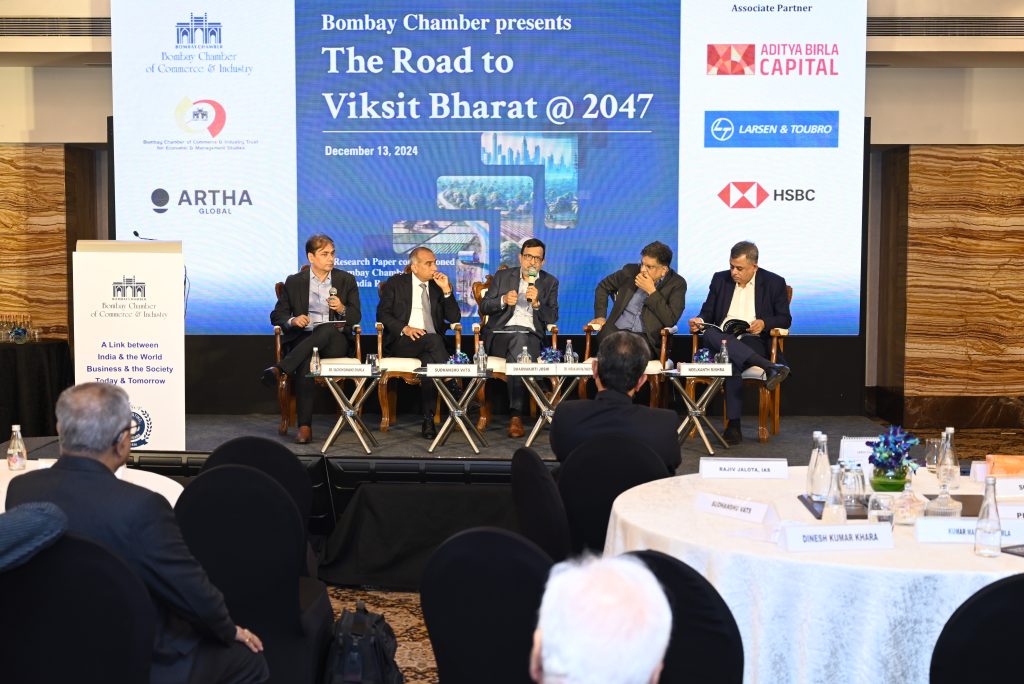
This was followed by a panel discussion on Viksit Bharat@2047: Blueprint for a Developed India. Moderated by Dr. Sachchidanand Shukla and including speakers like Sudhanshu Vats; Neelkanth Mishra, Chief Economist, Axis Bank; Dharmakirti Joshi, Chief Economist, CRISIL and Dr. Niranjan Rajyadhyaksha, it explored India’s path to becoming a developed nation by 2047.
Earlier in the day, Bombay Chamber hosted two events – the annual Sustainability Conclave themed Green Growth for a Viksit Bharat and the Smart City Leaders’ Conclave with industry experts deliberating on the topics.
Maharashtra notifies holidays under Negotiable Instruments Act for 2025
Maharashtra notifies holidays under Negotiable Instruments Act for 2025.
Copy of notification attached
Bombay Chamber Workplace Summit focuses on Building Adaptive Organisations
Bombay Chamber Workplace Summit focuses on Building Adaptive Organisations
Bombay Chamber of Commerce and Industry, India’s oldest Chamber, organised a Workplace Summit 2024 themed Building Adaptive Organisations, at its Conference Hall in The Ruby, Dadar yesterday.
The Summit covered several aspects such as the Hybrid Model of Work, the POSH Act: Its effectiveness and Mental Well Being at Work.
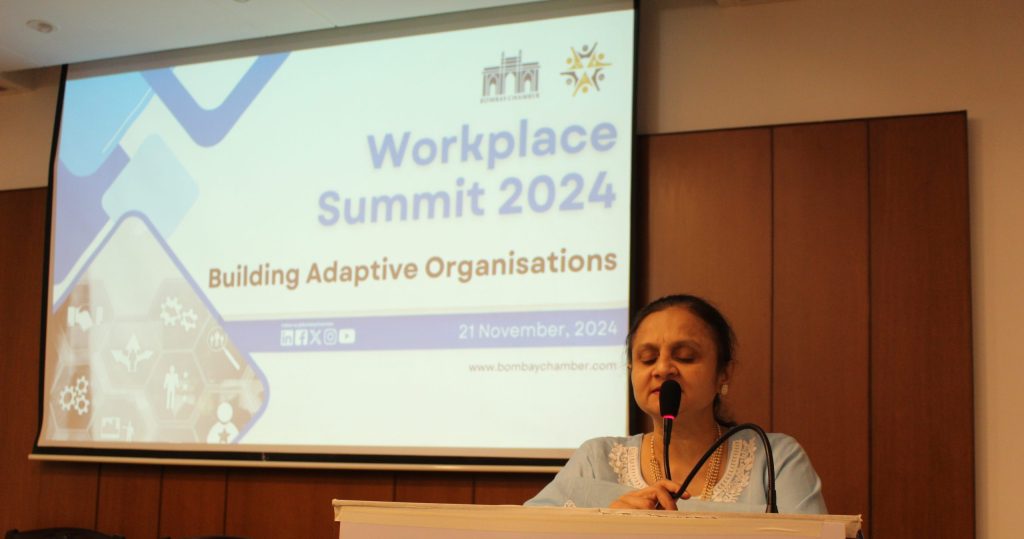
In her Welcome Address, Pinky Mehta, President, Bombay Chamber said, “As India’s oldest Chamber of Commerce & Industry, we have always offered knowledge forums in our conclaves and conferences to deliberate upon topical issues and the theme of today’s Workplace Summit is proof of that.”
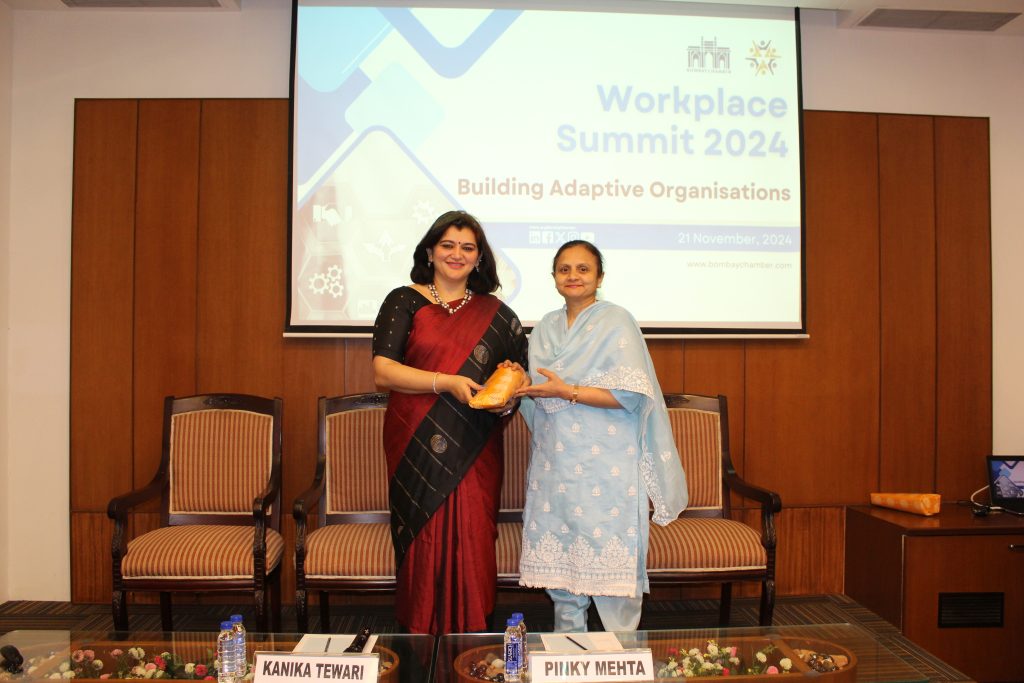
This was followed by a very interesting and interactive Masterclass on Inclusion Intelligence by Keynote Speaker, Kanika Tewari, Founder, GoDiverse. Tewari explained how inclusion intelligence fosters a sense of uniqueness and belonging in the workplace. With actionable strategies, frameworks, and case studies, the Masterclass delved into DEI with a focus on allyship. “Inclusion intelligence is when people feel individually unique and also included in the workplace. Learn from various frameworks and case studies on how to foster DEI in organisations with an emphasis on allyship and actionable strategies,” she said.
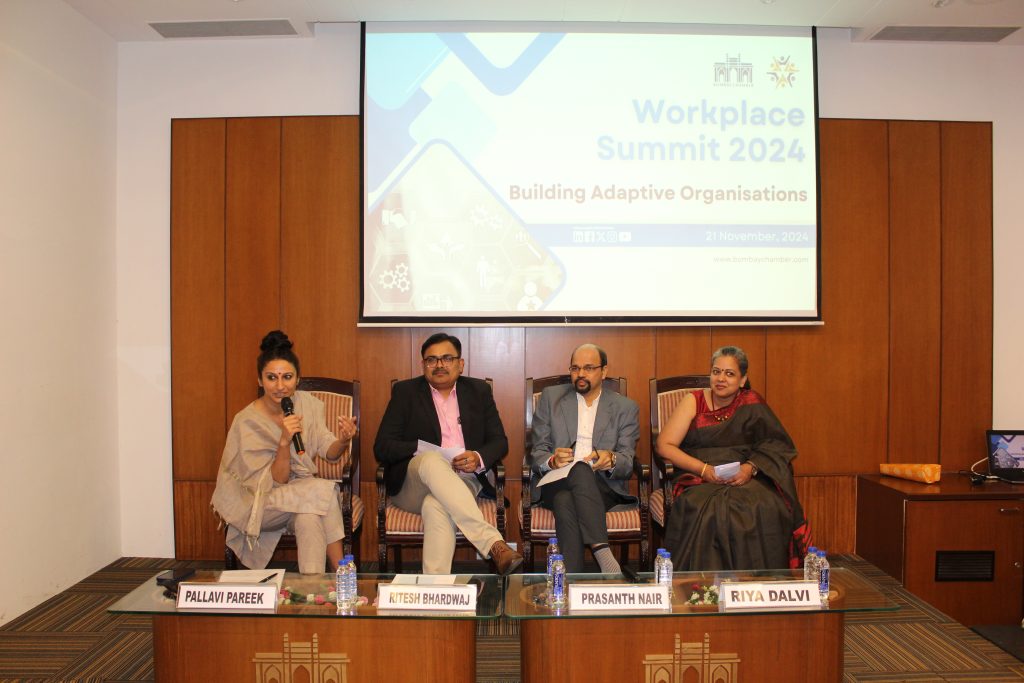
The first panel discussion was on Hybrid Model: The Future of Work. Moderated by Pallavi Pareek, Founder, Ungender, the panel included Ritesh Bhardwaj, CHRO, National Bulk Handling Corporation; Prasanth Nair, CHRO, Crompton Consumer and Riya Dalvi, Chairperson, Diversity Equity & Inclusion, RPG Group. The panel covered the aspects of data, technology and diversity and how the pandemic changed the work ecosystem and how today’s millennials have different needs and work requirements.
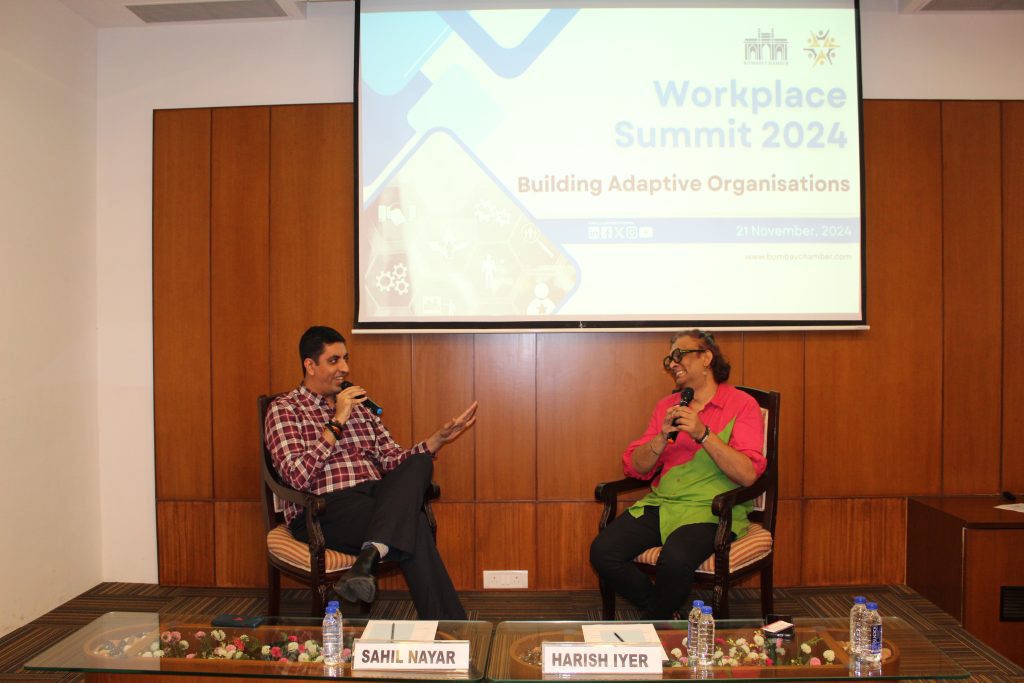
The Fireside chat on Gender Sensitisation in the Workplace was moderated by Sahil Nayar, an HR influencer and the guest was Harish Iyer, SVP and Head DE&I, Axis Bank. The Chat was held in a unique Q&A format between Nayar and Iyer.
Numbers do speak therefore internally there should be a check for inclusion. Sensitivity is inherent. If you give people the time to reflect on the goodness they could be sensitive. Build good pressure systems, set up a board of people who are advocates of Diversity. Organisations need to run on practice, not policies. These were some of the key takeaways from the conversation.
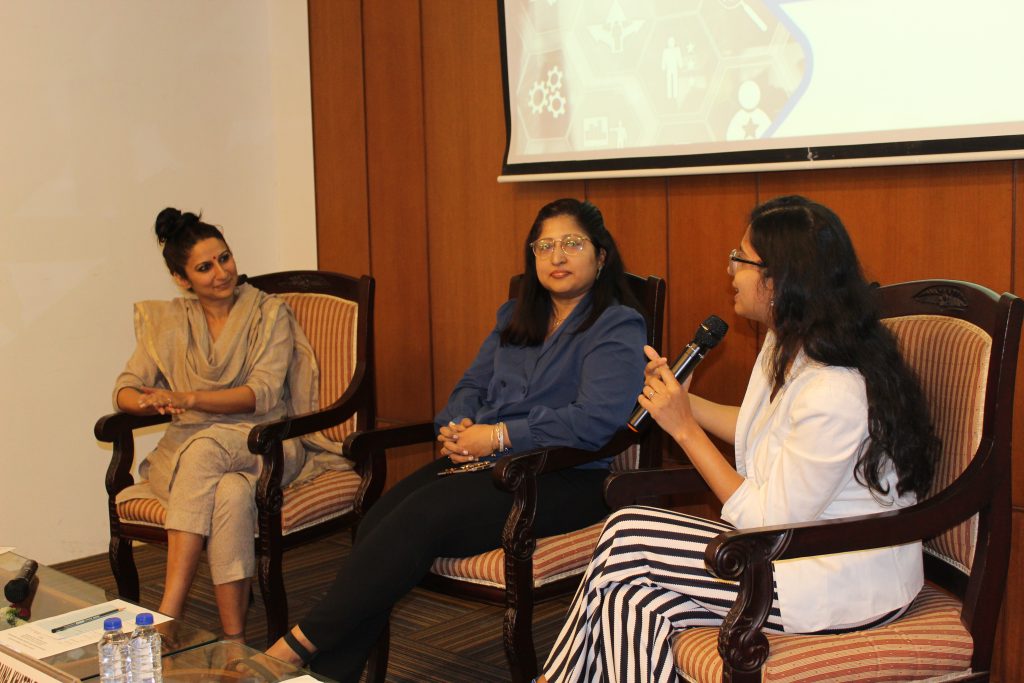
The second panel discussion was on A decade of the POSH Act: Is it Effective Enough? The panel was moderated again by Pallavi Pareek and the panelists included Shivangi Prasad, Author, Founder, The Legal Swan and POSH, Work & Respekt and Dr. Raina Khatri Tandon, CEO, RIGHT2RISE(R). Overall the environment has changed to a great extent and the Act has helped. It is gradual and slow, but the needle is definitely moving.
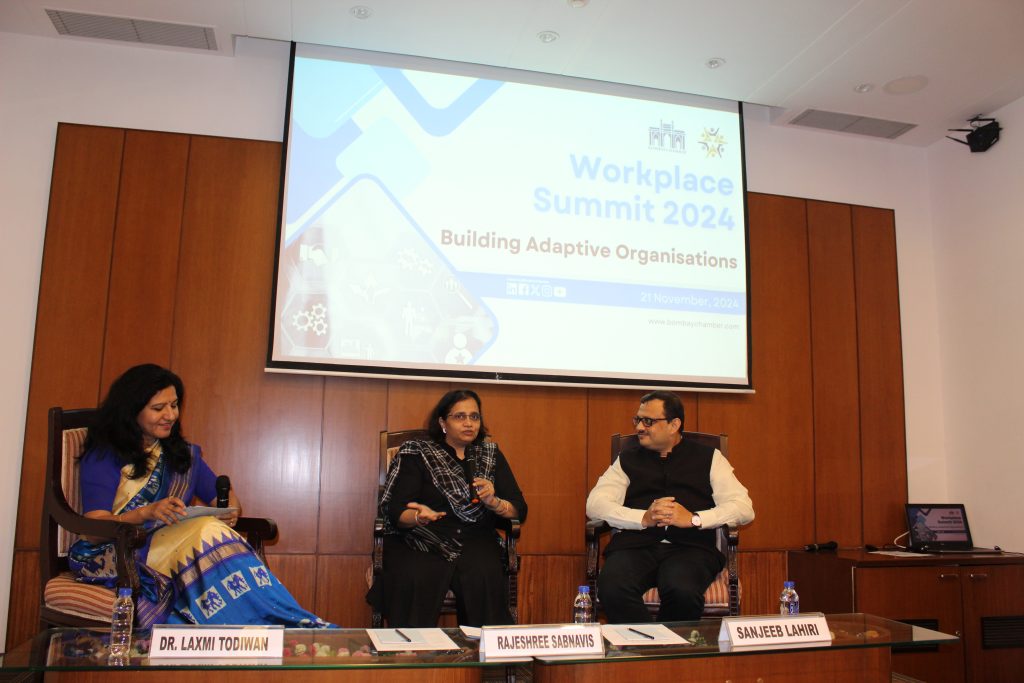
The third panel discussion on Health and Mental Well Being at Work was moderated by Dr. Laxmi Todiwan, Corporate Trainer, Author and Founder Indian Women in Hospitality and the panelists included Rajeshree Sabnavis, Senior Advisor – Tax, Regulatory, Finance Ecosystems, Grant Thornton Bharat LLP and Sanjeeb Lahiri, CHRO, GRP. The panel pointed out that if you have people who are motivated, companies will be able to achieve their bottom lines. Well being impacts work and companies will need to prioritise it.
Biotechnology Research and Innovation Council (BRIC) Celebrated its First Foundation Day on November 9-10, 2024
Biotechnology Research and Innovation Council (BRIC) Celebrated its First Foundation Day on November 9-10, 2024
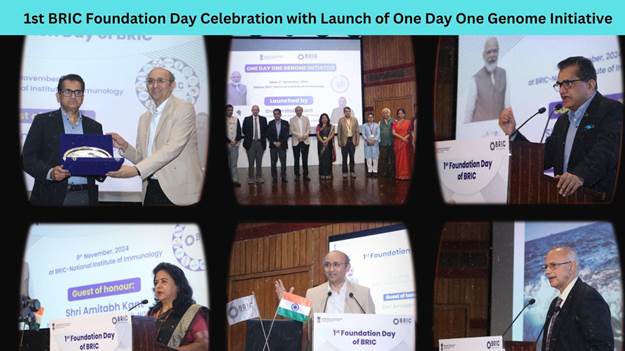
The Department of Biotechnology (DBT), Ministry of Science and Technology, celebrated the First Foundation Day of the Biotechnology Research and Innovation Council (BRIC) on November 9-10, 2024. BRIC, created with Cabinet approval on November 10, 2023, has subsumed 14 Autonomous Institutions (AIs) under the visionary leadership of Dr. Jitendra Singh, Minister of State (IC) for Science & Technology, and is at the forefront of driving excellence and innovation in the biotech sector.
The event was held at BRIC-National Institute of Immunology (NII), marking a significant milestone in the organization’s journey. Shri Amitabh Kant, India’s G20 Sherpa, graced the occasion as the Guest of Honor and delivered the Foundation Day lecture. Dr. Anand Deshpande from Persistent Systems was the Special Guest, while Dr. Rajesh S Gokhale, Secretary, DBT and Director General of BRIC, along with Directors of iBRIC, officials from DBT and BIRAC, researchers, and students from various iBRIC institutions, actively participated in the celebration.
Key Events on Foundation Day
1. “Race from Science to Entrepreneurship (RaSE)” Competition:
On November 9, 2024, BRIC organized a competition titled “Race from Science to Entrepreneurship (RaSE)” to encourage young talent from iBRIC+ institutes. The competition aimed to develop entrepreneurial skills by exposing students to challenges in the commercialization of biosciences, with a focus on the thematic areas highlighted in the BioE3 (Biotechnology for Economy, Environment, and Employment) Policy. Students from all fifteen iBRIC+ institutes showcased their innovative ideas during the event.
2. Sports Meet and Get-Together:
On November 10, 2024, a sports meet and social gathering were organized for the iBRIC+ institutes and DBT members. The activities included cricket, badminton, table tennis, and chess, aimed at fostering team spirit, promoting physical fitness, and strengthening the bonds within the DBT-iBRIC+ family.
Leadership Remarks
During the event, Dr. Rajesh S Gokhale emphasized the significance of BRIC in the biotechnology sector. He stated, “BRIC is playing a pivotal role in enhancing the value and impact both in the context of bringing research synergy, enhancing, and transforming the power of Science, Technology, and Innovation.”
Guest of Honor, Shri Amitabh Kant, lauded the efforts of the Department of Biotechnology, remarking, “BRIC would be a landmark institution for the country,” highlighting its potential to drive India’s biotech sector forward.
About BRIC
The Biotechnology Research and Innovation Council (BRIC) was established to consolidate the efforts of 14 Autonomous Institutions under DBT, promoting synergy, innovation, and research excellence. BRIC is committed to advancing the biotechnology sector by facilitating collaboration among scientists and researchers, aligning with national policies like BioE3, and contributing to India’s vision of becoming a global biotechnology hub.
Workshop on How to Win back Unhappy Customers
Workshop on How to Win back Unhappy Customers
The Young Bombay Forum of the Bombay Chamber organized an insightful workshop titled How to Win Back Unhappy Customers on October 23, 2024. Shruti Rathod from the Bombay Chamber welcomed the speaker and attendees, providing an introduction to the Bombay Chamber’s history and achievements, including milestones reached by the Young Bombay Forum. Nineteen delegates from various organizations participated in the event.
Dr. Lata Shetty, founder of Mainstream HRD Training Centre, served as the speaker for the workshop. Dr. Shetty is a distinguished professional, known for her expertise in HRD and customer relations. She previously authored a column for Lok Satta – Lok Mudra, and has served as a faculty member at Orchid Finishing School, Tata Institute of Social Sciences, and as visiting faculty at Somaiya Institute of Management.
The workshop opened with Dr. Shetty engaging participants to understand their specific challenges and expectations related to handling unhappy customers.
Workshop Objectives:
The session aimed to:
-
- Sensitize participants to the importance of retaining unhappy customers and understanding the business implications of customer dissatisfaction.
- Develop a positive attitude towards customer service, especially when handling grievances.
- Enhance understanding of quality customer service benchmarks and sharpen participants’ skills for retaining customer loyalty.
- Equip participants with strategies to address unhappy customers through various communication channels—face-to-face, over the phone, and in written communications.
Key Topics Covered:
Dr. Shetty addressed several important topics, including:
- Building a business-savvy approach towards unhappy customers.
- Analyzing common reasons for customer dissatisfaction.
- The financial and reputational benefits of regaining dissatisfied customers.
- Effective techniques for uncovering underlying reasons behind customer complaints.
- Developing communication plans aimed at winning back lost customers and rebuilding trust.
- Practical benchmarks for delivering high-quality customer service.
- Tailoring responses to unhappy customers based on the mode of communication (in-person, phone, email, or letter).
- Establishing long-lasting, positive relationships with customers.
Throughout the workshop, Dr. Shetty shared real-life case studies and interactive activities, allowing delegates to discuss specific challenges and receive practical, actionable feedback. The workshop’s highly interactive format received excellent feedback from participants, who appreciated the valuable insights and tools provided to improve their customer service practices.
Webinar on The Manager’s Toolkit
Webinar on The Manager’s Toolkit
The Young Bombay forum of Bombay Chamber had organized Webinar on The Manager’s Toolkit held on 22nd Oct.’ 2024. Shruti Rathod, Bombay Chamber welcomed the speaker and delegates. She introduced and briefly spoke on historical milestones of Bombay Chamber and Young Bombay Forum. There were 35 delegates participated from different organisations.
Charu Sabnavis, Director, Delta Learning was the speaker for the webinar. She shared a thought-provoking and practical insights with the delegates.
Primarily, she introduced and explained the topic and connected with the delegates for the challenges and expectations about the Role of the Manager, Leadership Styles and managing remotely. She also asked delegates to share their experiences about the best managers they have worked with and What is it about them which they admire? Voluntarily everyone shared their experiences with the speaker.
She explained and elaborate on the below pointers.
Balancing the task and relationship, Empowering and developing people, Setting people up for success, Skill development, Delegation – a win-win!, Process of delegation, Pitfalls of delegation, Managing performance and delivering feedback, The performance pipeline, Framework for giving constructive feedback, Situational Leadership, Adapt your leadership style based on the situation and maturity of the individual.
She also explained The AID model – Action – describe the behavior – Impact – state the impact – Decision – Arrive at an action plan, Appreciation and positive feedback.
Charu stressed on best practices for managing a team remotely, communicating regularly, building trust, Empathizing, being organized and being positive.
She explained the concept and topics on manager’s toolkit with the help of various activities, tasks and case studies. Overall, the entire webinar was highly interactive where delegates discussed their challenges with the speakers and got practical meaningful responses on the subject. The webinar received excellent feedback.
Bombay Chamber and FTI Consulting organises Generative AI Session
Bombay Chamber and FTI Consulting organises Generative AI Session
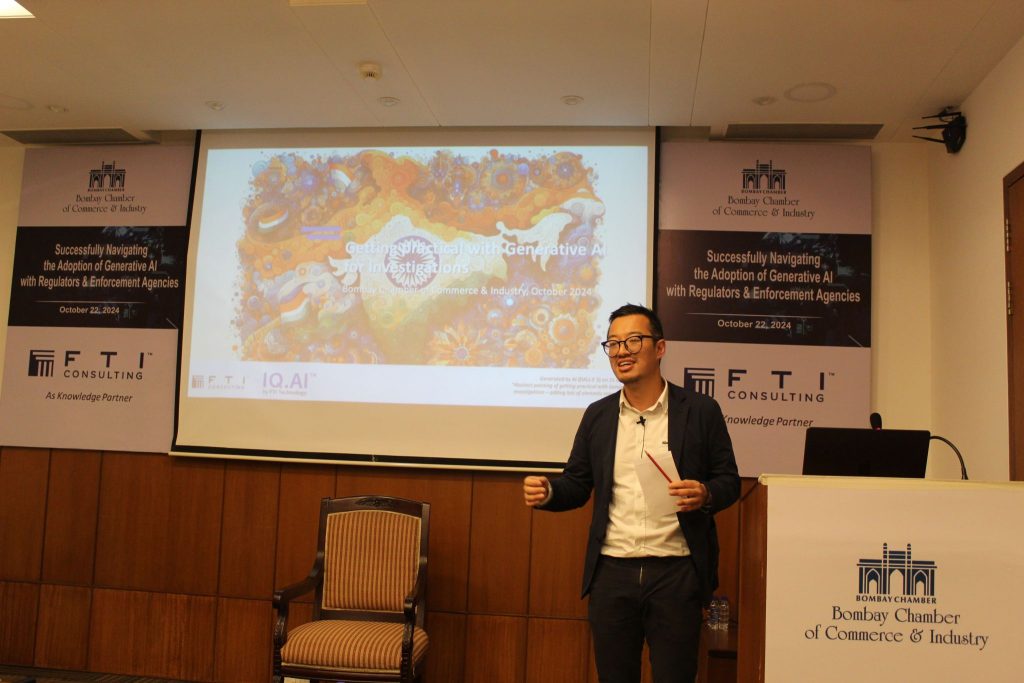
The Bombay Chamber, in association with FTI Consulting as the knowledge partner, conducted a session on Generative AI.
Jon Chan, FTI Consulting’s eDiscovery Innovation and AI leader conducted a 90-minute session titled “Successfully Navigating the Adoption of Generative AI with Regulators and Enforcement Agencies.” This session included an optional 20-minute hands-on labs experience, where attendees utilized laptops and sample data to explore various prompts, models, and concepts, including hallucinations and prompt engineering in an investigative environment.
The session offered practical applications of Generative AI within disputes and investigations, equipping legal, compliance, and investigation leaders with insights on effectively incorporating this technology into their operations. Attendees gained actionable strategies for integrating AI to enhance efficiency and support organisational goals.
Designed for professionals focused on governance, risk, and compliance, the discussion addressed the unique challenges and opportunities posed by Generative AI in regulated environments. FTI’s extensive experiments with this emerging technology provided transparency around associated risks and considerations.
As AI rapidly evolved, organisations learned the importance of navigating uncharted territories, particularly in experimentation and result validation to mitigate risks and support new processes enabled by Generative AI. The session delivered expert perspectives on managing regulatory scrutiny, addressing potential risks, and responsibly leveraging AI to improve operational efficiency while fulfilling legal and compliance obligations.
Following the session, attendees had the opportunity to network during a lunch, fostering discussions around the insights shared and the future implications of Generative AI in their respective fields.


It is a long established fact that a reader will be distracted by the readable content of a page when lookin







